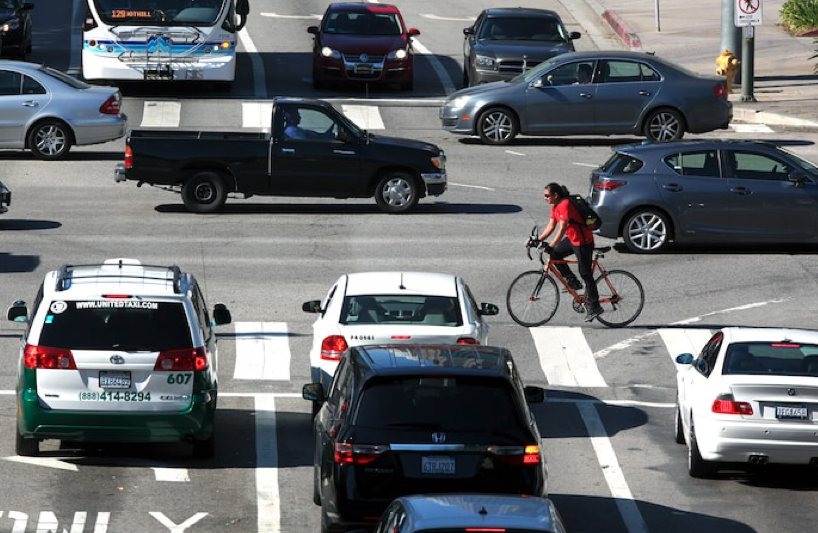News | State of California Set to Give $1000 for Going Car-less
Stop the VideoNews

State of California Set to Give $1000 for Going Car-less
Wednesday, September 7, 2022
by Jacob Wong, USC Master of Public Policy, 2023
The California State Legislature passed a bill on Wednesday that would make qualifying state residents eligible for a $1,000 tax credit if they do not own a private vehicle. If signed by Governor Gavin Newsom, the legislation would take effect in the 2023 tax year.
SB 457 was introduced to the legislature by Senator Anthony Portantino of Senate District 25. “As the impacts of climate change are felt across our state, it’s time we more aggressively commit to implementing modes of sustainable transportation,” said the senator in a public release on his website. “SB 457 is an important step towards that goal.”

A cyclist maneuvers his way through downtown Los Angeles traffic on in 2014. (Richard Vogel/AP)
Cutting down on the state’s emissions output has been one of California’s primary goals over the past few decades, passing legislation that set aggressive GHG emissions caps such as CA AB 32 in 2006 and SB 32 in 2016.
Through its efforts, the state of California has managed to get ahead of schedule on its climate goals, reducing its emissions output below 1990 levels in 2020, which was the target set in AB 32. However, the state still has progress to make to reach its next target of a 40% reduction from 1990 levels by 2030.
The state has passed a number of headline-grabbing policies in recent years to meet these emissions reductions targets, particularly focusing on the transportation sector which contributes to over 40% of the state’s total emissions output. One such policy is a ban on the sale of new gas-powered vehicles by 2035 that the state air resources board voted on last month.
The state tax credit is the latest effort by California to chip away at its lofty emissions reductions targets, although there are questions surrounding its effectiveness. Only low-income households earning below $60,000 or individuals below $40,000 annually will be eligible for the credit. Existing data on transit ridership indicates that this population has a strong overlap with the majority of current public transportation users. In 2019, 81% of LA Metro riders had annual household incomes below $40,000, and the top five neighborhoods in Los Angeles County by transit ridership had an average median household income over $20,000 less than the county average. These trends have raised some questions over whether the bill would incentivize many existing car owners in higher tax brackets to switch.
Despite these concerns, supporters of the bill including its own author view policies such as SB 457 as the most effective plan in the near-term. According to reporting by LAist, Portantino views the tax credit program, which is currently a scaled-back version of his original $2,500 proposal, as a more feasible test to see if the model would work. As he states, “To a low-income family, $1,000 is real money.”
About the Author:
Jacob is a second-year MPP student at the Price School of Public Policy. He is interested in urban policy and transportation planning issues. As a recent LA transplant, he enjoys exploring the area and the local food scene in his free time.
News Archive
- December (1)
- November (6)
- October (4)
- September (2)
- August (3)
- July (4)
- June (3)
- May (7)
- April (8)
- March (11)
- February (8)
- January (7)
- December (7)
- November (8)
- October (11)
- September (11)
- August (4)
- July (10)
- June (9)
- May (2)
- April (12)
- March (8)
- February (7)
- January (11)
- December (11)
- November (5)
- October (16)
- September (7)
- August (5)
- July (13)
- June (5)
- May (5)
- April (7)
- March (5)
- February (3)
- January (4)
- December (4)
- November (5)
- October (5)
- September (4)
- August (4)
- July (6)
- June (8)
- May (4)
- April (6)
- March (6)
- February (7)
- January (7)
- December (8)
- November (8)
- October (8)
- September (15)
- August (5)
- July (6)
- June (7)
- May (5)
- April (8)
- March (7)
- February (10)
- January (12)















